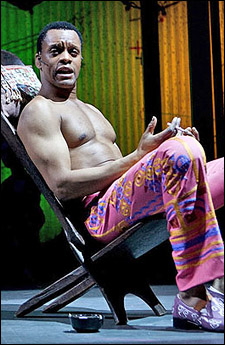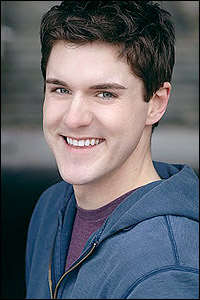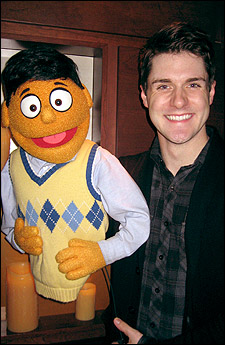
*
Mambo Mania
Zimbabwe-born Kevin Mambo is one of the two Felas in Fela!, the new Broadway musical about Nigerian activist-hedonist-musician Fela Kuti. He alternates performances with Sahr Ngaujah, and one visit to the high-energy show makes it clear why one guy alone could not perform the role of the revolutionary musician night after night.
"It would be impossible," Mambo says. "Very physically demanding, vocally demanding. This character really talks and sings through the whole play, as well as choreography, as well as physical and athletic moves."
Mambo's warm-up often begins two hours before the show.
The actor's first big break was on the now-defunct soap "The Guiding Light," for which he won two Daytime Emmys and never looked back. How is Fela! going so far?
Kevin Mambo: Things have been going well. We're really happy with the show, with the crowds, the response has been really phenomenal. It has also been a learning experience for me.
I was curious about that. In what ways has the show been different than your expectations?
Mambo: The show itself has been very, very physical. Much more physical than I am used to. It requires an incredible amount of stamina just to get through. There's no slowing down and there's no stopping.
Did you have a lot of dance experience prior to Fela!?
Mambo: No, I really didn't. I did dance some in college, mostly in class. I would never consider myself a dancer.
Was that intimidating to you, diving into a physical show with famed choreographer Bill T. Jones at the helm?
Mambo: My experience has been to go in with both feet and see where I end up. This is a really phenomenal group of people. In terms of choreography, I came into a first-rate production. For a short amount of time it was intimidating, but you can't give over to that, otherwise you're not going to get anywhere. I was coming off of doing Ruined [at Manhattan Theatre Club] where I was 50 pounds heavier than I am now. So I knew in order to do the physical work, the dance work, etc., I was just going to have to really get disciplined and commit to a physical schedule, commit to stripping off some weight and having a stronger body which entailed running, weightlifting, diet, yoga, as well as studying video of the [Off-Broadway Fela!] production at 37 Arts from last year.
 |
||
| Kevin Mambo |
||
| photo by Monique Carboni |
Mambo: It's been great. I don't think I've ever been quite this strong, physically. It was like a sports gig, training for this. These dancers are professional athletes, without question. Do you enjoy being a part of a show that mixes such entertaining music with important themes?
Mambo: To me it is so amazing how revolutionary Fela was. His music is really going through an honest resurgence. People are hearing it for the first time, and most of his music is so timeless, the way it was written. You wouldn't think that it was written in the '70s or the early '80s. It lives in its own dimension. Many countries in the African paradigm are still dealing with the same issues he is talking about in these songs. In terms of the downtrodden, in terms of the government taking advantage of their people… Unfortunately, for many people those messages are still relevant. Those are some of the places we connect with our audience directly. We do one number called "ITT (International Thief Thief)." ITT was a company that had been doing a lot of work in Nigeria at the time. When we start flashing the signs about all the international thieves, you could also get Enron, Halliburton, AIG… So in many ways, these kinds of power struggles are still relevant.
Isn't it interesting how much more sway a political artist can have in smaller countries, how much scarier he can be for the government?
Mambo: I think because the balance of power is so extreme. Like in today's hip-hop here, you have some artists who are completely political, but you have an upper class, a middle class and a lower class. In somewhere like Nigeria, the upper class is so small, and you have the masses living on top of each other, [political] stuff is deadly relevant to them, and it is immediate. It reflects whether they're going to have electricity at night, whether people will make it to work tomorrow or have food on the table or someone's going to get beaten by the police.
Do you and Sahr have an additional understudy for both of you?
Mambo: We do have one, yes, for further down the line. As of right now, I'm covering Sahr and Sahr's covering me. He's out tonight, his back is hurt, so I'm in for both shows.
So this will be a long night for you with a good night's sleep when it's over.
Mambo: [Laughs] It will, because I had to do last night's show too, so I'll be kind of tired.
There are so many good extended grooves in this show. I am curious how you keep track of musical changes, when songs are ending, etc.
Mambo: When you watch old video, you will see Fela cue the band to each new section of music. It is not arbitrary. There are long sections where the musicians vamp and solo, but the band knows its music so well. You start to realize with some of the later arrangements that Fela did, they were huge suites, of 12-15 sections. So it's deceptive. It is very complicated music that on the surface appears very simple. With all the percussion, you have at least seven or eight different rhythm lines expressing themselves at the same time. The deeper you listen, the more you hear. You can listen for months and go, "I never heard that guitar part before!" Very dense arrangements but played so well, it sounds simple.
You were born in Zimbabwe. Did you live there long enough to remember it?
Mambo: I moved away when I was quite young, but we would go back home a fair amount. Shona is my first language. English is my second language. If you grow up with parents from another country, that's the country you really grow up in, no matter where you are!
Did you ever envision yourself on Broadway?
Mambo: I never thought it would be anything like this. When you are an actor and you are young and ambitious, you always imagine other jobs. Years ago, due to paperwork issues, I had the opportunity to take over for Mos Def in Top Dog/Underdog, and for immigration reasons, it just never happened, and I thought to myself, "Oh my god! Acting with Jeffrey Wright. That was going to be the best job ever!" Funny enough, years later, I have landed on the best job ever. I can't imagine anything better than this.
[Fela! is now playing at the Eugene O'Neill Theatre, 230 W. 49th Street. For more information, go to www.felaonbroadway.com]
 |
||
| Seth Rettberg |
||
| photo by Jordan Matter |
As Avenue Q transitioned from Broadway to Off-Broadway, Seth Rettberg has made the leap to the New World Stages production, bringing his puppet alter-egos Rod and Princeton along with him. The native of Naperville, IL, who also did the first national tour of Q, believes moving the show Off-Broadway in fall 2009 re-energized the fan base and cast in equal measure. "The audiences keep coming," he says. "So as long as people keep wanting to see it, we'll be around." How aware of Avenue Q were you before you were part of it?
Rettberg: I always was interested in the show. I was in college at the time that it won the Tony Award. I remember sitting around watching with my friends and saying, "What is this crazy puppet show about, and how can we be a part of it?" I grew up watching "Sesame Street" and "The Muppet Show," and they were such a part of my everyday life as a kid, that you become so used to seeing humans interact with puppets, especially when it comes to being funny and entertaining. So it seemed very natural to me. I certainly had no aspirations of being a puppeteer at all. But once the show came along, it combined my love for musical theatre with something I always loved watching, so I thought, maybe this is a good fit for me. It was quite the journey, learning about puppeteering and what an art form that is.
Was the puppet training intense?
Rettberg: It was challenging, to stay the least. I had probably five or six auditions. I graduated from College-Conservatory of Music in Cincinnati in 2006, and I started my audition process in January of 2007. That continued through the end of March. Part of what that involves is what they call a puppet camp, which is a two-day intensive training process where they try to see if you can get the basics down: learning to speak and having your voice and words match what the puppet is doing, learning to walk with the puppet and breathe with the puppet. All these things you don't really think about. You just become so much more aware of your body. It's very self-motivating. You have to practice and watch other people who are good at puppetry do it. I go back and watch "The Muppet Show" from many years ago, and I am used to watching it for entertainment value, but now I watch from a technical place and it becomes so much more fascinating.
 |
||
| Seth Rettberg with the Princeton puppet |
||
| photo by Aubrey Reuben |
Rettberg: The interesting thing about the show is at first glance it seems kind of like a silly sort of funny puppet show that is all out there for the laughs. But the show has such a huge heart to it. That's what takes people by surprise. They start to feel for these characters that are made of felt and foam and fur. I think people don't expect that. They relate on a human level to these characters. These journeys of these young adult characters resonate with people, whether it's trying to find out one's purpose in life or losing a job and trying to find out what the next step is, trying to navigate adult relationships. All those things we learn as young adults [are] being taught to us by creatures that are reminiscent of those that taught us lessons as kids. Looking at your acting résumé, you seem like someone who can handle romantic lead-work as well as comic energy.
Rettberg: I wasn't really sure where I'd be fitting into the world of theatre and the business of it, but I do see myself as the funny leading man in a way. This show has taught me more about myself as an actor than I ever could have imagined. Being the only show I've ever been in for any extended period of time, I've kind of grown up in it, in a way. It has been really interesting to see how different things that have happened in my personal life have been reflected in this show. I did a couple productions of Urinetown, and that show is in such a similar vein to Avenue Q. Having done Avenue Q for so long, if I go into auditions or little cabaret performances, I always have to take a second and go, "Okay, there's no puppet on your hand. You can be yourself!"
When you are Rod or Princeton, do you think about whether people are looking at you, Seth, or do even you lose yourself up there?
Rettberg: Good question. At first, it becomes very much about you and the puppet. But once you really get it into your body, you sort of become one and the same in a weird way. For the audience, it is a really interesting process. I'll tell you my experience when I first saw the show. I compare the first ten minutes to being like when you watch a foreign film for the first time and you are navigating back and forth between the actors and the subtitles. Eventually you realize that you are really just watching the action. Eventually people come to discover that the puppet is capable of expressing so much from having the human face next to it. The puppets are only built with one expression, they are not manipulated in the face, just the body. So the infinite array of expressions we can create as human beings are magically translated to this inanimate object next to the human being. Do you have a preference between Princeton and Rod? Are you allowed to say?
Rettberg: You know, I love them both equally, but I must say Rod holds a special place in my heart. Maybe it's because of his uptightness which sometimes I tend to share. He's good at heart, and he's such a lover of life. I think his journey in the show is quite wonderful. He's one of the characters the audience loves so much.
Have you ever met John Tartaglia, who created the roles on Broadway?
Rettberg: You know, I haven't. That is so funny that you ask me because I was thinking the other day, I feel like I've met everyone who has ever been a part of the show except John. So there's an open invitation to John Tartaglia. I would love to meet him at some point in time. There is so much connection. Our director Jason Moore is the director of Shrek, and various other people from the original Broadway cast who I have had the pleasure of doing the show with, including Ann Harada and Jordan Gelber, but I've never worked with John, and I'm so anxious for that to happen.
Who are your acting heroes?
Rettberg: Bryan d'Arcy James is one of the people I admired growing up, especially in college. I think it was the consistency of his work and work ethic that I really latched onto and appreciated in so many ways. I always was very inspired by his recordings and performances.
And were there people in your formative years who helped encourage you?
Rettberg: My parents were very supportive of me at every stage of this crazy dream to be an actor. There are two other individuals, Sue Aldridge and Margo Krug, both of whom were directors in children's theatre and in high school. They could not have been better in terms of inspiring me and encouraging me to go forward and really giving me a place where I felt safe, where I felt I could be creative and take risks.
You looking beyond Avenue Q at all or just taking it as it comes?
Rettberg: I'm really taking it as it comes right now. I feel like so many doors have been opened for me from Avenue Q alone, that I feel like whatever's around the bend will be an amazing journey, no doubt. So for the time being, I'm happy to be living on the Q.
[Avenue Q is playing at New World Stages, 340 West 50th Street. Check out avenueq.com for more info.]
Hither and Yon
Not a bad time to be Stanley Tucci, eh? Academy Award-nominated for "Julie and Julia" and directing Lend Me a Tenor, about to go into rehearsals for a Broadway run at the Music Box…Chad Kimball of Memphis stars in The Philanderer, part of Project Shaw, which presents the works of George Bernard Shaw. That's Feb. 15 at 7 PM at The Players Club in Manhattan. Visit projectshaw.com…Gregg Edelman has a couple of dates at Feinstein's at the Loews Regency Feb. 7-8, and Ryan Silverman of The Phantom of the Opera performs there on Feb. 15. Go to feinsteinsattheregency.com for calendar and ticket details…Edelman will also be a part of The Oscar Show at Birdland on Feb. 28. That's Jamie DeRoy's show celebrating Academy Award-winning music and movies. Go to birdlandjazz.com.
Tom Nondorf can be reached at [email protected].









